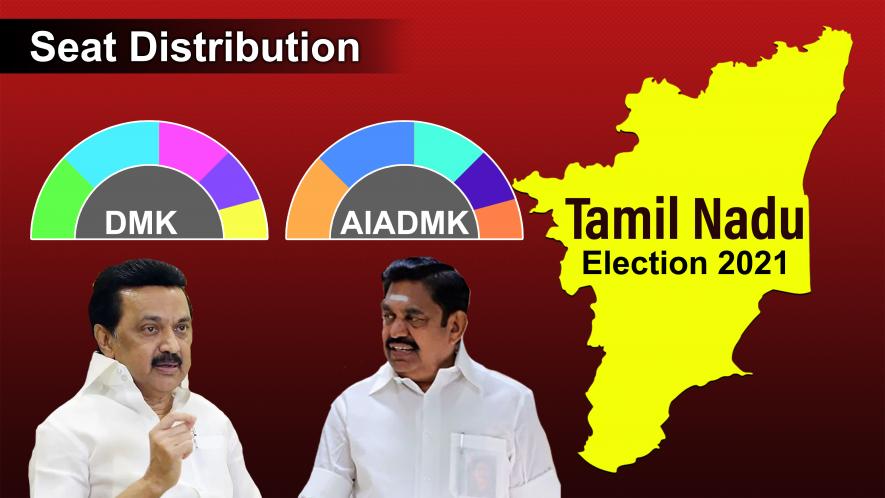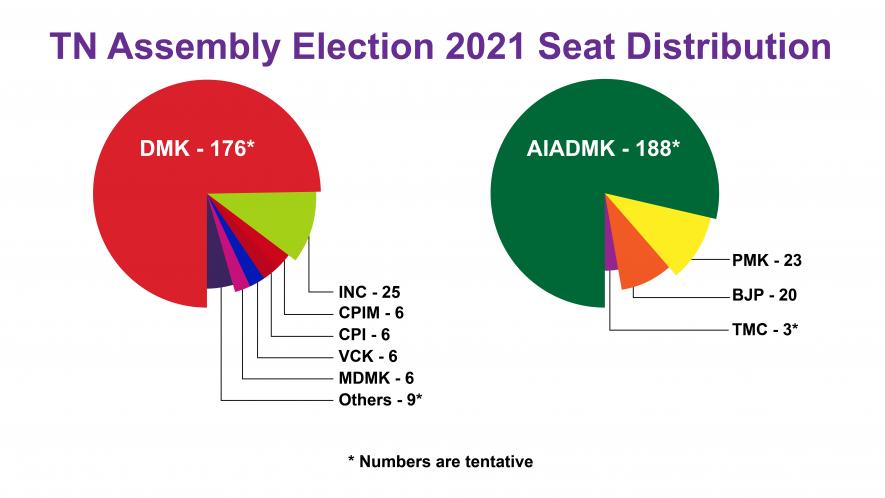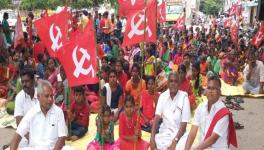TN Assembly Election: What AIADMK and DMK Alliances and Seat Share Deals Reflect

The seat sharing pacts of the Dravida Munnetra Kazhagam (DMK) and the All India Anna Dravida Munnetra Kazhagam (AIADMK) led alliances for the 234 constituencies in the upcoming Tamil Nadu Assembly elections is slowly winding up following negotiations between the respective parties.
After much discussion and visible disappointment, Congress signed the pact to contest 25 constituencies in the DMK-led Secular Progressive Alliance. Its other major allies – Communist Party of India (CPI), Communist Party of India (Marxist) (CPI(M)), Viduthalai Chiruthaigal Katchi (VCK) and Marumalarchi Dravida Munnetra Kazhagam (MDMK) settled for six seats each after bargain.
Talks in the AIADMK-led alliance were held in a hush-hush manner, and if there were similar apprehensions is yet unclear. The Bharatiya Janata Party (BJP) have agreed for 20 seats, a considerable number for the party, given its meagre cadre base in the state. However, it wields power in the alliance as the ruling party in the Centre. The Pattali Makkal Katchi (PMK) bagged 23 seats in the alliance.

Image courtesy: R. Prakash
But, what developments do these numbers actually reflect in terms of the changed political scenario in the state?
AIADMK’S LOSS, BJP’S GAIN
The AIADMK, more or less, contested independently in the 2016 Assembly elections and won a considerable majority of 135 seats. The party fought in 227 constituencies, forgoing only seven seats to its allies. But this year, the AIADMK is likely to contest 188 seats, nearly 40 seats less than what it contested in the previous Assembly election.
Also read: As Tamil Nadu Polls Near, Both AIADMK and DMK Struggle to Accommodate Allies
With the demise of AIADMK leader J Jayalalithaa in 2016, the fight for succession turned nasty within the party. Its alliance with the right-wing BJP in the 2019 general elections changed its political colour in the state. Notably, the AIADMK-PKM-BJP alliance in the recent general elections won only in 1 out of the 39 parliamentary constituencies. Coupled with these, the many corruption charges and strong anti-incumbency is significant in the party’s downward slide and the seat distribution numbers are reflective of it.
The PMK, which contested independently and faced a terrible blow having lost all the 234 seats it contested in the 2016 Assembly elections, has got 23 seats in the AIADMK-led ruling alliance. Similarly, the BJP, which contested 188 seats in 2016 and won none of them, has got 20 seats in the alliance.
For the BJP this is a big win. From being an insignificant party in the state to contesting along with one of the big state parties, which is also the ruling party, shows considerable growth within a matter of five years. The BJP has once again used its powers of being the ruling party at the Centre as a sceptre to strike chords in the state, and the AIADMK seems to have bowed down to it.
DMK FIRM, CONGRESS FEEBLE
DMK stalwart K Karunanidhi's demise did not bring about a stir similar to what Jayalalithaa’s death had wrought on the AIADMK. A relatively clear sense of succession prevailed in the DMK, as late leader Karunanidhi’s son gradually took over his legacy in the party.
In 2016, DMK contested in 178 seats and is likely to contest 176 seats this time. The DMK is hell-bent on retaining its seat share even though its alliance partners have expanded.
Also read: TN Assembly Elections: DMK Gears up as Favourite with Stalin at Helm
Much bargain was visible in the Secular Progressive Alliance, but the DMK seemed to have stood its ground with respect to numbers. Many of its allies heeded to its steadfastness to retain the ‘secular votes’ within a single camp and to resist the growth of the BJP in Tamil Nadu.
The DMK’s long-time alliance partner Congress’ seats have reduced from 41 in 2016 to 25. The DMK has eaten into the Congress seat share, and distributed some of them to the other alliance parties.
It is difficult to state whether the DMK's assertion reveals its growth or it is merely taking advantage of its allies. But, it is surely reflective of Congress’ deterioration. Having been throttled state after state, it is slowly reducing in size in Tamil Nadu as well.
RESISTANCE TO BJP
In 2016, besides the AIADMK and the DMK fronts, the Makkal Nala Kootani (People’s Welfare Alliance) with the DMDK, MDMK, CPI, CPI(M), TMC and VCK formed a third front. But, the parties of this front have either allied with the DMK or the AIADMK for the upcoming polls.
AIADMK’s alliance with the BJP in the 2019 parliamentary elections was decisive in splitting the People’s Welfare Alliance. The secular forces - CPI, CPI(M), VCK and MDMK - allied with the DMK and Congress to resist the growth of BJP in Tamil Nadu, while Tamil Manila Congress and actor Vijayakanth’s DMDK allied with AIADMK.
BJP contested with Indhiya Jananayaga Katchi (IJK) in 2016. IJK has allied with actor Kamal Haasan’s Makkal Neethi Maiam (MNM) for the forthcoming elections. This raises questions about the political leanings of the MNM-led camp, which is slowly taking shape.
The Desiya Murpokku Dravida Kazhagam (DMDK), ally of AIADMK and BJP in the parliamentary elections, recently severed ties over seat shares.
Political parties will begin filing nominations for the Tamil Nadu Assembly elections in another three days. The nomination process, which will begin on March 12, is to go on till 19th of this month.
But talks on which party will contest in which constituency and who would be their candidates have not picked up pace. Whether political parties will contest on their own symbols or the rising sun symbol of the DMK and the two leaves symbol of the AIADMK is also still uncertain.
Also read: TN Elections: Left Wields Pockets of Influence, Thanks to History of Leading People’s Struggles
Get the latest reports & analysis with people's perspective on Protests, movements & deep analytical videos, discussions of the current affairs in your Telegram app. Subscribe to NewsClick's Telegram channel & get Real-Time updates on stories, as they get published on our website.
























